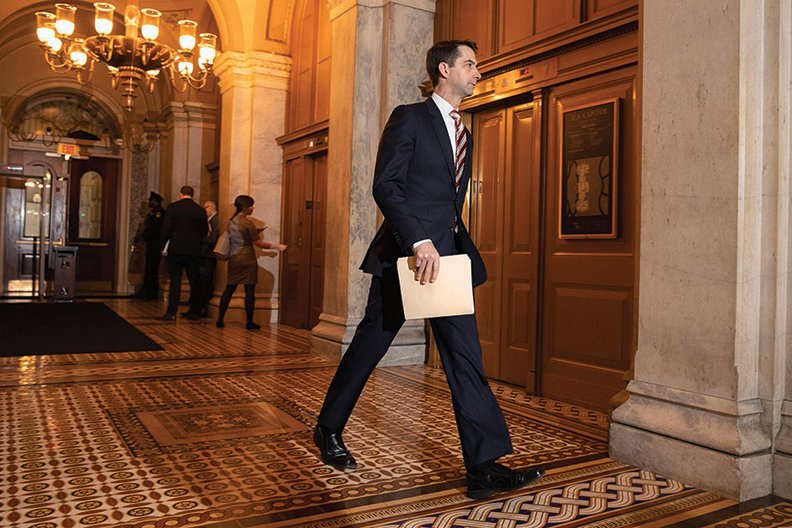U.S. Sen. Tom Cotton, R-Ark., has been credited as one of the first to recognize the global threat posed by the coronavirus, a menace the state's junior senator said the presidential impeachment trial and China's lack of candor obscured.
Cotton's press office told The Sentinel-Record he began to see the latent crisis during the Senate trial. He excused himself from the chamber to warn the administration.
"Thanks to China's lying about the scale and magnitude of the disease, combined with the distractions of impeachment, the country was not as aware of the threat as it could've been," the press office said, noting that a more proactive response could've been marshaled if the country's focus wasn't on the trial.
"The virus was still in its infancy during the later days of the proceedings. With the media, members of Congress and the administration working around the clock on impeachment, it stands to reason that not as much time and energy were devoted to coronavirus response as should've been in the early stages.
"In fact, Sen. Cotton, largely the first U.S. official to sound the alarm, was only able to do so by stepping out of impeachment several times to speak to the administration."
Cotton and others have called the virus the "China Virus," a descriptive blamed for fomenting anti-Asian sentiment. The phrasing isn't a comment on the Chinese people, the senator's office said, but a critique of their ruling party. Cotton has said the Chinese Communist Party's opacity and slow response fueled the spread of the virus.
"By calling the virus a name indicative of its origin, Sen. Cotton seeks to hold the CCP to account," the press office said. "His use of the term 'China Virus' is in reference to the corrupt Chinese government, not the Chinese people, who are the first and may be the worst victims of the disease.
"Sen. Cotton does not believe the Chinese Communist Party has been forthcoming with true numbers of the infected and the dead. Many U.S. news reports concur. ... They also should have allowed in foreign experts earlier to fight the disease. By covering it up, the Chinese government has cost thousands their lives."
Cotton cites the University of Southampton study in support of his criticism of the Chinese response. Funded by the Bill and Melinda Gates Foundation, the study used data collected from location-based services to gauge the effectiveness of early detection, quarantining, travel restrictions and social distancing in reducing the virus' spread.
According to a summary of the study, China's number of cases would have been reduced by 95% if it had implemented the strategies three weeks earlier. A 66% reduction would have been realized if the government had acted a week earlier, demonstrating the importance of acting early. The efficacy of early response was further underscored by the study's prediction that 18 times the number of cases would have occurred if containment measures were enacted three weeks later.
"(The study) indicated that if the Chinese Communist Party had not silenced doctors, journalists and censored internet mentions of the disease, then the damage from the disease could've been reduced by 95%," Cotton's press office said.
The federal government's response has been blamed for the virus' spread in the United States, which has become the world leader in reported cases. President Donald Trump publicly dismissed calls to act earlier, and presidential guidelines for social distancing and other measures referenced in the study weren't issued until mid-March.
Cotton's press office said the president's decision to stop travel between the United States and China slowed the spread of the virus. According to a timeline provided by the office, Cotton urged the president's cabinet to halt travel from China in late January. Two days later the president announced the travel ban.
"The administration took an important early step in blocking travel from China, largely at the request of Cotton and other officials, requests which Democrats called xenophobic," the press office said when asked by The Sentinel-Record to assess the administration's response to the pandemic.
Local on 04/05/2020
